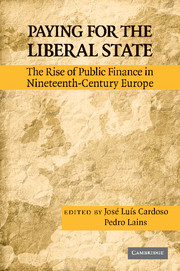Book contents
- Frontmatter
- Contents
- List of contributors
- Acknowledgments
- Paying for the Liberal State
- Introduction: Paying for the Liberal State
- 1 Creating Legitimacy: Administering Taxation in Britain, 1815–1914
- 2 The Development of Public Finance in the Netherlands, 1815–1914
- 3 The Apogee and Fall of the French Rentier Regime, 1801–1914
- 4 The Evolution of Public Finances in Nineteenth-Century Germany
- 5 Public Finance in Austria-Hungary, 1820–1913
- 6 The Rise of the Fiscal State in Sweden, 1800–1914
- 7 Always on the Brink: Piedmont and Italy
- 8 Public Finance and the Rise of the Liberal State in Spain, 1808–1914
- 9 Public Finance in Portugal, 1796–1910
- 10 Conclusion: The Monetary, Fiscal, and Political Architecture of Europe, 1815–1914
- Index
- References
9 - Public Finance in Portugal, 1796–1910
Published online by Cambridge University Press: 05 June 2012
- Frontmatter
- Contents
- List of contributors
- Acknowledgments
- Paying for the Liberal State
- Introduction: Paying for the Liberal State
- 1 Creating Legitimacy: Administering Taxation in Britain, 1815–1914
- 2 The Development of Public Finance in the Netherlands, 1815–1914
- 3 The Apogee and Fall of the French Rentier Regime, 1801–1914
- 4 The Evolution of Public Finances in Nineteenth-Century Germany
- 5 Public Finance in Austria-Hungary, 1820–1913
- 6 The Rise of the Fiscal State in Sweden, 1800–1914
- 7 Always on the Brink: Piedmont and Italy
- 8 Public Finance and the Rise of the Liberal State in Spain, 1808–1914
- 9 Public Finance in Portugal, 1796–1910
- 10 Conclusion: The Monetary, Fiscal, and Political Architecture of Europe, 1815–1914
- Index
- References
Summary
Introduction
In the beginning of the nineteenth century, Portugal was an economically ‘backward’ country with a relatively weak state in the context of Western Europe. The turmoil provoked by the wars with France since 1796 and the three Napoleonic invasions between 1807 and 1811 affected, to a considerable extent, the performance of its economy and the functioning of its state. The 1820 liberal revolution and, two years later, the political independence of Brazil, Portugal's main colony, made the situation even more difficult. Such difficulties were largely overcome in the following century, in which important economic, political, and institutional changes occurred. One such important transformation was the development of its own liberal state. This chapter discusses how this transformation occurred and, crucially, how it was financed by taxing the economy and raising debt.
The challenges of transformation were indeed immense. Most important, it was necessary to pacify the country, which remained severely affected by the wars and the invasions. The defeat of the absolutists by the liberals in the 1832–4 civil war was a major step toward pacification. Even if military confrontation did not end totally then, it became essentially political in the next decades. In a first stage, the political confrontation was intense, as it revolved around the constitutional format of the new liberal regime: one defined by the moderate Constitution Charter of 1826 and the other by the radical Constitution of 1838.
- Type
- Chapter
- Information
- Paying for the Liberal StateThe Rise of Public Finance in Nineteenth-Century Europe, pp. 251 - 278Publisher: Cambridge University PressPrint publication year: 2010
References
- 5
- Cited by



